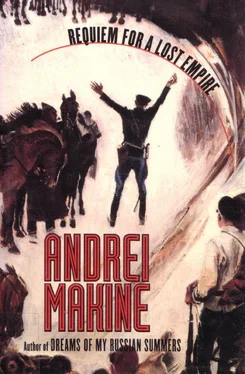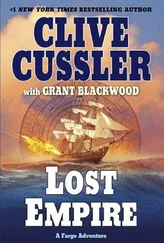"A former left-winger who's become a press magnate and is still campaigning against Soviet imperialism?"
"Not that either. I can see that, after years of idleness, you're losing your touch. Next guess."
"No idea. Someone I know?"
"A man you've met and who in those distant days used to be called Mr. Scalper. We always used to joke about how well the name suited him. Do you remember? Well, you knew him better than I did."
"Yes, it all comes back. Ron Scalper, the arms dealer with almost artistic tastes. He used to leave two or three days before the killing started. It was as if he could smell the blood. And he had the habit of saying to the Peeping Toms who stayed behind to film the performance of his guns, 'Get some black-and-white pictures for me, with Africans in them. That generally turns out best.' We really wanted to scalp him. So has he moved into arts sponsorship?"
"Well, he's been hugely successful since then. He runs a big American firm with several arms factories, a research institute, and some specialist journals. For rocket launchers he's one of the best in the world."
"But that film? Is he trying to redeem himself or what? I can hardly see him shedding tears, not even crocodile ones, over the mass graves in the camps."
"No, the film is simply high-class publicity. They have a department that looks after all this agitprop. The competition's very fierce in the arms trade, as you well know. It's no longer enough to show films shot by the Peeping Toms intended for a few officials. You have to work in-depth on public opinion in a country. Get people used to the idea that it's always been the Americans who came to the rescue and that these days the Russians can't even make a decent saucepan. The whole of Eastern Europe is going to be reequipped with American arms. Contracts worth tens of millions. Very soon the Americans won't have a single man on welfare. So it's worth financing a few films and running a few little wars, here and there, just to test the product."
"And all that high society who were there just now. Do you think they'll remember anything about the film tomorrow?"
"Ah, products like that aren't designed to make people remember but to make them forget. Forget the battle of Moscow, forget Stalingrad, Kursk. I've talked to the sponsor: the next episode's already in production. It's going to be called The Soldiers of Liberty. El Alamein, battles in the Pacific, the Normandy landings, the liberation of Europe -and that's the whole of the Second World War. And above all, not a word about the Eastern front. It never existed. Furthermore, and he told me this in all seriousness, ' El Alamein was the first great victory, the real turning point in the war!' In their war, that is."
Shakh lowered his voice, smiled at me, and added in apologetic tones, "There! I've started repeating your speech for the defense." He fell silent, then, doubtless not wishing to leave the impression of a man who had lost his cool, continued in tones where no rancor could now be heard, "You know, when all's said and done, this trafficking in the past may also be a way for them to avoid thinking about it. I grumble because I've seen tank tracks covered in ground meat at the battle of Kursk. I remember the rainstorm beating down on those thousands of tanks that evening, the water boiling and rising up from the burning steel in clouds of steam. But dinosaurs like me will soon be gone. As for the new generation, try talking to them about Kursk. It would spoil their joie de vivre. Look at that idiot, he's going to get himself run over."
In the street the soccer fans with their flags and bottles were marching along among the cars, which honked as they swerved to avoid them.
"And in order to pass their exams they'll repeat what they've been taught: once upon a time there was a wicked man called Hitler who didn't like the Jews and killed six million of them and would have killed more if the Americans hadn't come down from heaven with their jeeps and their chocolate bars. And the hardest thing will be for them to learn the names of the camps by heart. But they'll invent some mnemonic device. That's how we learned the names of the Great Lakes of America: Erie, Michigan, Huron, Superior, Ontario. There's a kind of jingle to it, no? They're sure to find one for Buchenwald."
In the feigned levity in his voice, I sensed the desire to keep at bay the questions we could not avoid. I stared at his face, which had aged the way the faces of men of action age: the dangers overcome are transformed into an outward appearance of steadfastness and lines of force expressing strength. And it seemed to me increasingly unlikely that within the next few minutes this man might tell me where I could find you.
Shakh must also have noticed that we were talking about the film in order to avoid speaking about what our meeting had suddenly revealed. He fell silent and cocked his head a little to one side. Then, gazing out of the window he remarked, "That said, at the sight of all the Parisian glamor this evening, I was remarking to myself, as I often do when I come here, that our friend Jansac- you remember that agent we negotiated with in Aden who died shortly after the hostages had been released-yes, I was saying to myself that, instead of repatriating his body, the Legion would have done better to bury him down there, in a tomb cut into the black rocks looking out toward Aden, across the Strait of Bab el Mandeb. I find it hard to picture him living or dying here in this country, such as it has become."
I waited no further and asked him about you. I knew that the initial tone of his voice would already tell me a great deal. He gave me a quick, hard look, probing me with an unspoken question, as if to say, "It's me you're asking?" But what he said dispelled this air of reproach immediately.
"I don't know what's happened to her. I would certainly never have met up with you again in order to tell you of her death. Condolences from relations and friends was not her style. But, for your own sake, think carefully. It's often easier to live in vague hope. As long as you don't know…"
"But that's it: I want to know."
Shakh gave me another hard look, then he confided to me, as if reluctantly "Her last identity was German. A German who'd lived in Canada for a long time and returned to Europe. So you can forget your Russian quest. Don't waste your time. All you'll find among these Russian women living in Paris will be violinists from Saint Petersburg, Ukrainian prostitutes, and Muscovite wives. Sometimes all combined in one person. I'll be coming back through France in ten days' time and by then I think I'll know which country you need to look for her in."
Before our next meeting I had time to take stock of what had changed in Shakh. It would have been easy to say he had aged. Or to explain the bitterness that showed through in his words by the disappearance of the country he had served for so many years. But there was something else. He was now working without any protection, like a trapeze artist whose safety net has been taken away, and worst of all, if he were caught, without the slightest hope of being traded for a westerner, as they used to do in the old days. I mentioned this to him when I saw him again. I said that in Moscow they were thinking more about opening Swiss bank accounts than spiriting away agents. He smiled. "Sooner or later, you know, we shall all be spirited away by the good Lord."
That evening, on the day of our second meeting, we were indeed talking about those years when everything in Moscow had turned upside down. The years when the Kremlin was turning into a swollen Mafia tumor whose cancerous spread undermined the whole country. The years when, as in the panic after a lost battle, they were abandoning former allies, writing off wars, dismantling the army. The period when the collapse of the empire was tearing apart, link by link, the intelligence networks woven during the seventy years of its existence. The period when we never knew if an agent who failed to keep a rendezvous had been intercepted by the Americans or sold down the river by our own people. The period when one day I had watched you disappearing into the crowd at Frankfurt airport after a few deliberately inconsequential words of good-bye.
Читать дальше










